Analyzing Media Coverage on Gender Issues and African Women
VerifiedAdded on 2020/03/01
|57
|17369
|71
Thesis and Dissertation
AI Summary
This dissertation investigates media coverage of gender issues in Africa, focusing on the representation of African women in various contexts. The research employs a positivism philosophy and a deductive approach, utilizing stratified sampling and a descriptive design for qualitative analysis. The study examines how media channels portray women in political, socio-economic, sports, and entertainment spheres, exploring potential under-representation, objectification, and sexualization. Findings reveal that media often under-represents African women in political and socio-economic domains while objectifying them in sports and entertainment. The dissertation concludes that negative portrayals and limited coverage significantly impact African women's self-esteem and overall development. Recommendations include promoting inspiring stories and interviews featuring successful African women, along with women-centric documentaries, movies, and video clips to educate and influence the mass. The research also acknowledges its limitations and suggests future research directions, emphasizing the importance of media's role in shaping perceptions and fostering positive change.
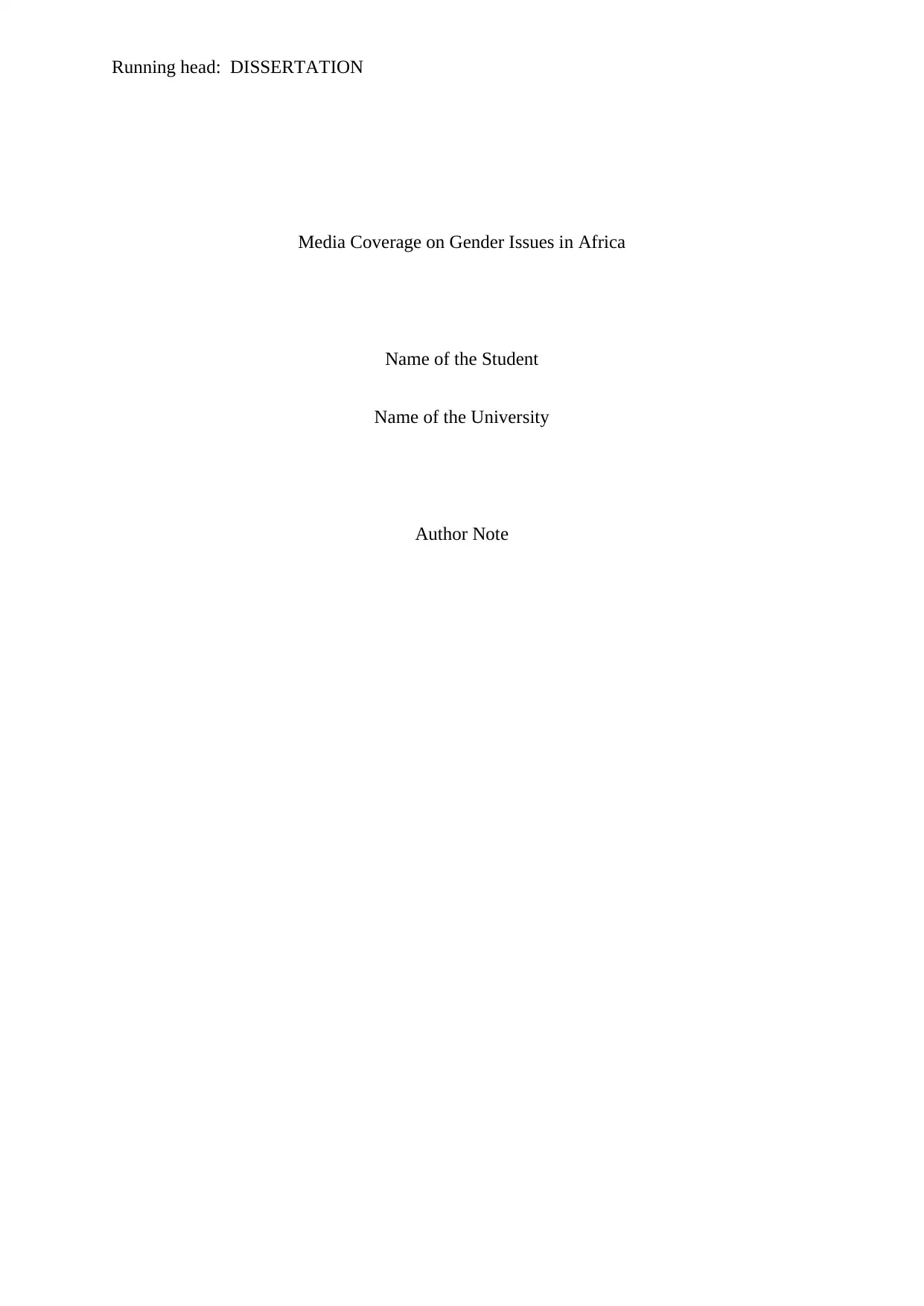
Running head: DISSERTATION
Media Coverage on Gender Issues in Africa
Name of the Student
Name of the University
Author Note
Media Coverage on Gender Issues in Africa
Name of the Student
Name of the University
Author Note
Paraphrase This Document
Need a fresh take? Get an instant paraphrase of this document with our AI Paraphraser
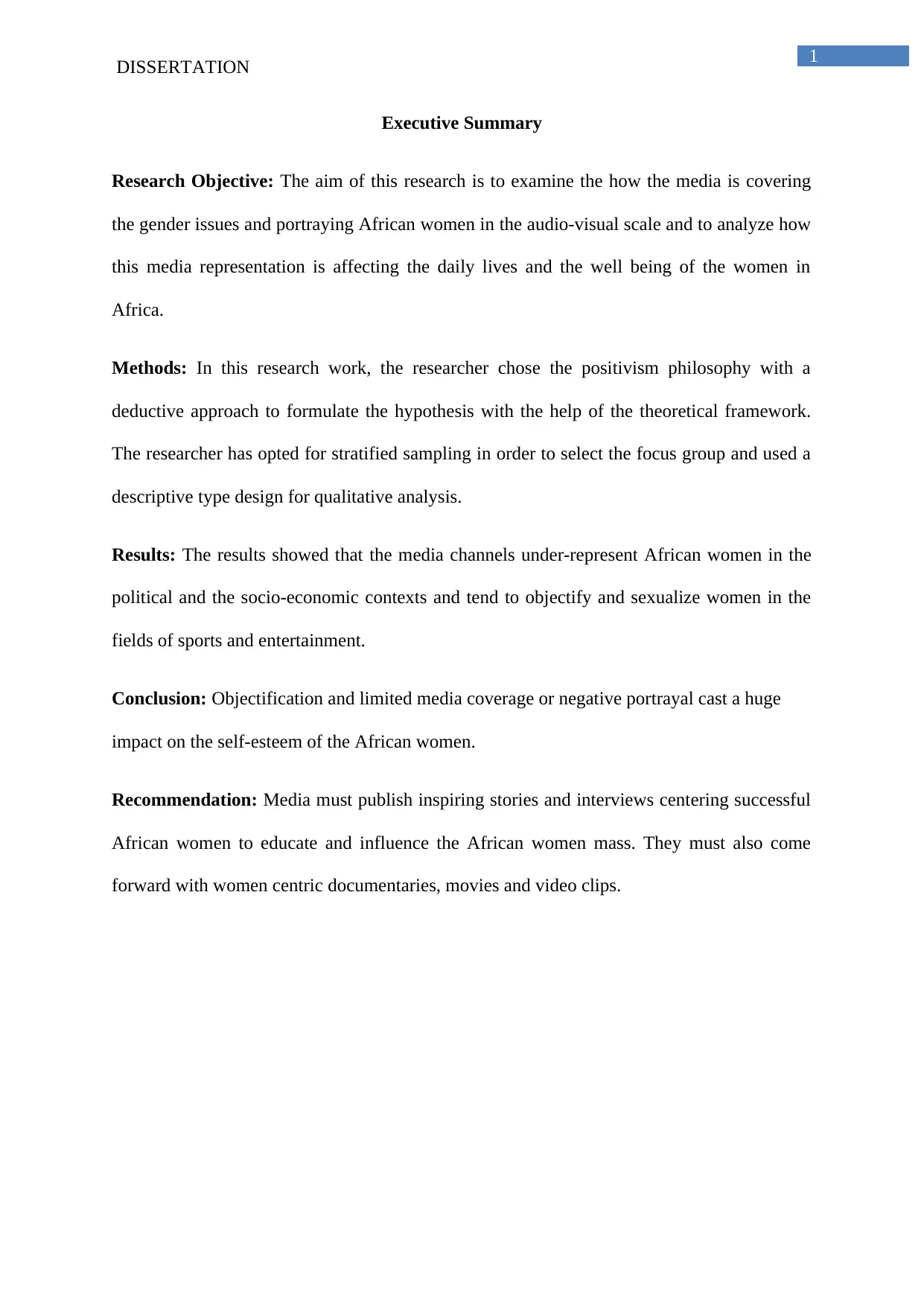
1
DISSERTATION
Executive Summary
Research Objective: The aim of this research is to examine the how the media is covering
the gender issues and portraying African women in the audio-visual scale and to analyze how
this media representation is affecting the daily lives and the well being of the women in
Africa.
Methods: In this research work, the researcher chose the positivism philosophy with a
deductive approach to formulate the hypothesis with the help of the theoretical framework.
The researcher has opted for stratified sampling in order to select the focus group and used a
descriptive type design for qualitative analysis.
Results: The results showed that the media channels under-represent African women in the
political and the socio-economic contexts and tend to objectify and sexualize women in the
fields of sports and entertainment.
Conclusion: Objectification and limited media coverage or negative portrayal cast a huge
impact on the self-esteem of the African women.
Recommendation: Media must publish inspiring stories and interviews centering successful
African women to educate and influence the African women mass. They must also come
forward with women centric documentaries, movies and video clips.
DISSERTATION
Executive Summary
Research Objective: The aim of this research is to examine the how the media is covering
the gender issues and portraying African women in the audio-visual scale and to analyze how
this media representation is affecting the daily lives and the well being of the women in
Africa.
Methods: In this research work, the researcher chose the positivism philosophy with a
deductive approach to formulate the hypothesis with the help of the theoretical framework.
The researcher has opted for stratified sampling in order to select the focus group and used a
descriptive type design for qualitative analysis.
Results: The results showed that the media channels under-represent African women in the
political and the socio-economic contexts and tend to objectify and sexualize women in the
fields of sports and entertainment.
Conclusion: Objectification and limited media coverage or negative portrayal cast a huge
impact on the self-esteem of the African women.
Recommendation: Media must publish inspiring stories and interviews centering successful
African women to educate and influence the African women mass. They must also come
forward with women centric documentaries, movies and video clips.
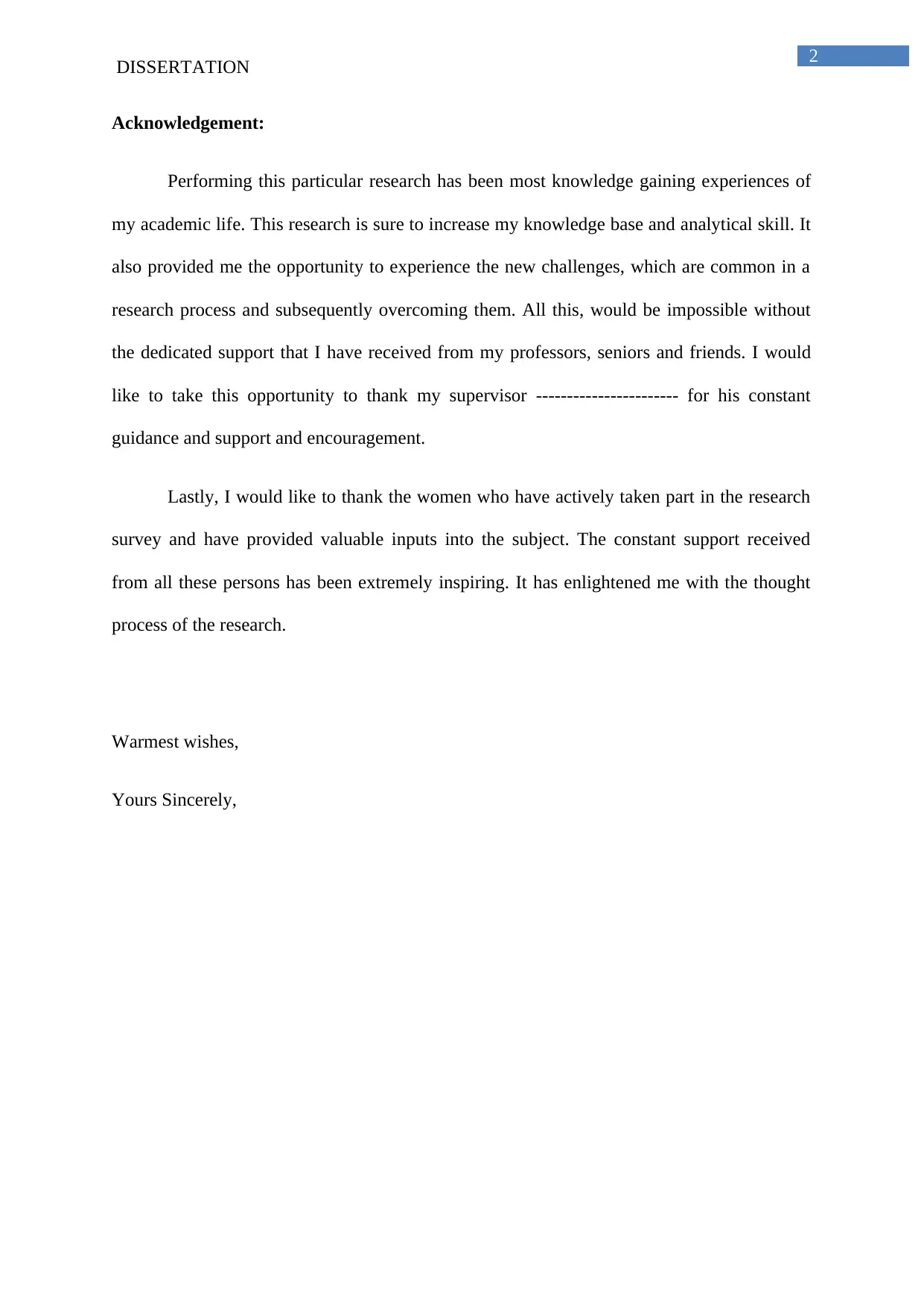
2
DISSERTATION
Acknowledgement:
Performing this particular research has been most knowledge gaining experiences of
my academic life. This research is sure to increase my knowledge base and analytical skill. It
also provided me the opportunity to experience the new challenges, which are common in a
research process and subsequently overcoming them. All this, would be impossible without
the dedicated support that I have received from my professors, seniors and friends. I would
like to take this opportunity to thank my supervisor ----------------------- for his constant
guidance and support and encouragement.
Lastly, I would like to thank the women who have actively taken part in the research
survey and have provided valuable inputs into the subject. The constant support received
from all these persons has been extremely inspiring. It has enlightened me with the thought
process of the research.
Warmest wishes,
Yours Sincerely,
DISSERTATION
Acknowledgement:
Performing this particular research has been most knowledge gaining experiences of
my academic life. This research is sure to increase my knowledge base and analytical skill. It
also provided me the opportunity to experience the new challenges, which are common in a
research process and subsequently overcoming them. All this, would be impossible without
the dedicated support that I have received from my professors, seniors and friends. I would
like to take this opportunity to thank my supervisor ----------------------- for his constant
guidance and support and encouragement.
Lastly, I would like to thank the women who have actively taken part in the research
survey and have provided valuable inputs into the subject. The constant support received
from all these persons has been extremely inspiring. It has enlightened me with the thought
process of the research.
Warmest wishes,
Yours Sincerely,
⊘ This is a preview!⊘
Do you want full access?
Subscribe today to unlock all pages.

Trusted by 1+ million students worldwide
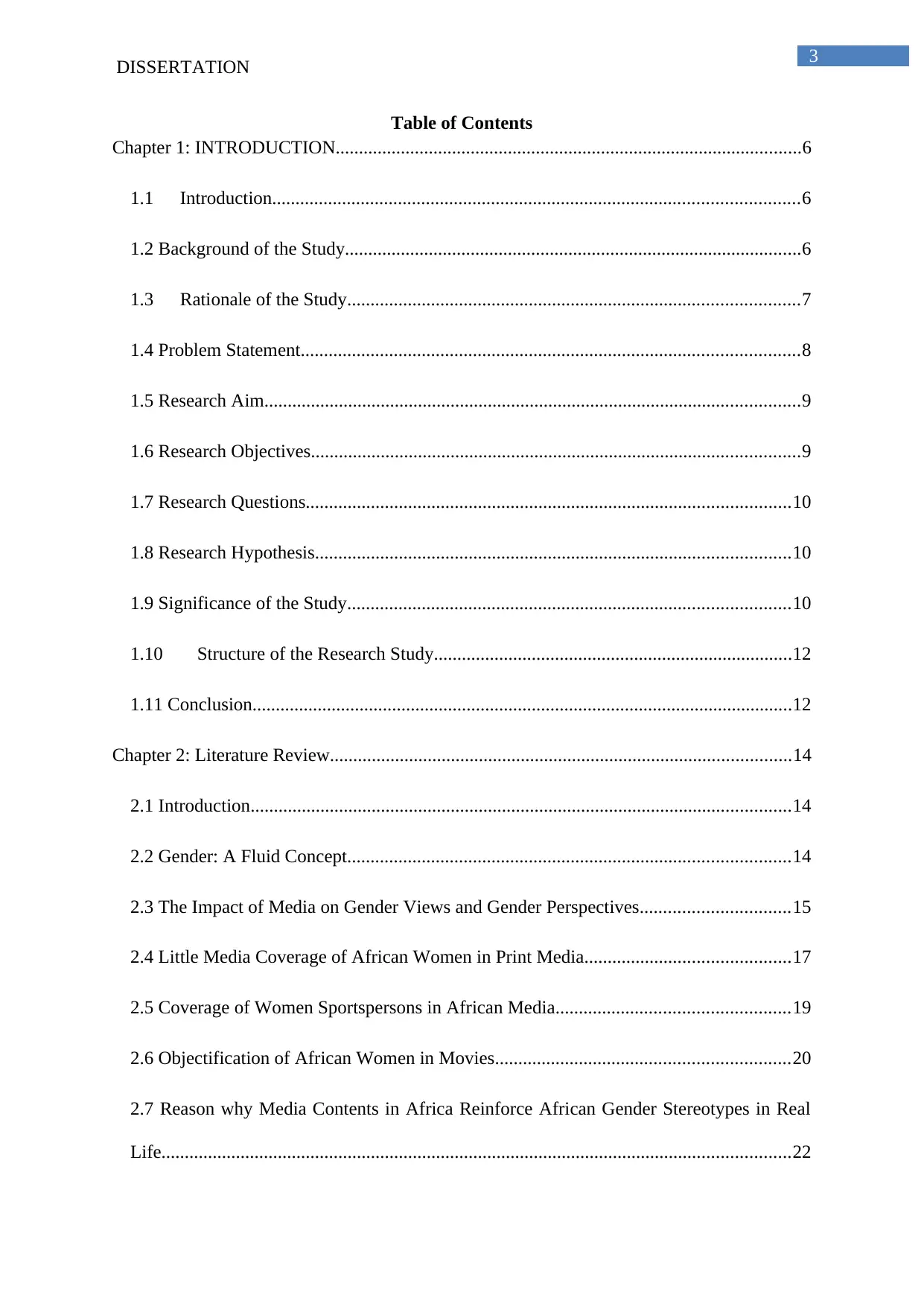
3
DISSERTATION
Table of Contents
Chapter 1: INTRODUCTION....................................................................................................6
1.1 Introduction.................................................................................................................6
1.2 Background of the Study..................................................................................................6
1.3 Rationale of the Study.................................................................................................7
1.4 Problem Statement...........................................................................................................8
1.5 Research Aim...................................................................................................................9
1.6 Research Objectives.........................................................................................................9
1.7 Research Questions........................................................................................................10
1.8 Research Hypothesis......................................................................................................10
1.9 Significance of the Study...............................................................................................10
1.10 Structure of the Research Study.............................................................................12
1.11 Conclusion....................................................................................................................12
Chapter 2: Literature Review...................................................................................................14
2.1 Introduction....................................................................................................................14
2.2 Gender: A Fluid Concept...............................................................................................14
2.3 The Impact of Media on Gender Views and Gender Perspectives................................15
2.4 Little Media Coverage of African Women in Print Media............................................17
2.5 Coverage of Women Sportspersons in African Media..................................................19
2.6 Objectification of African Women in Movies...............................................................20
2.7 Reason why Media Contents in Africa Reinforce African Gender Stereotypes in Real
Life.......................................................................................................................................22
DISSERTATION
Table of Contents
Chapter 1: INTRODUCTION....................................................................................................6
1.1 Introduction.................................................................................................................6
1.2 Background of the Study..................................................................................................6
1.3 Rationale of the Study.................................................................................................7
1.4 Problem Statement...........................................................................................................8
1.5 Research Aim...................................................................................................................9
1.6 Research Objectives.........................................................................................................9
1.7 Research Questions........................................................................................................10
1.8 Research Hypothesis......................................................................................................10
1.9 Significance of the Study...............................................................................................10
1.10 Structure of the Research Study.............................................................................12
1.11 Conclusion....................................................................................................................12
Chapter 2: Literature Review...................................................................................................14
2.1 Introduction....................................................................................................................14
2.2 Gender: A Fluid Concept...............................................................................................14
2.3 The Impact of Media on Gender Views and Gender Perspectives................................15
2.4 Little Media Coverage of African Women in Print Media............................................17
2.5 Coverage of Women Sportspersons in African Media..................................................19
2.6 Objectification of African Women in Movies...............................................................20
2.7 Reason why Media Contents in Africa Reinforce African Gender Stereotypes in Real
Life.......................................................................................................................................22
Paraphrase This Document
Need a fresh take? Get an instant paraphrase of this document with our AI Paraphraser
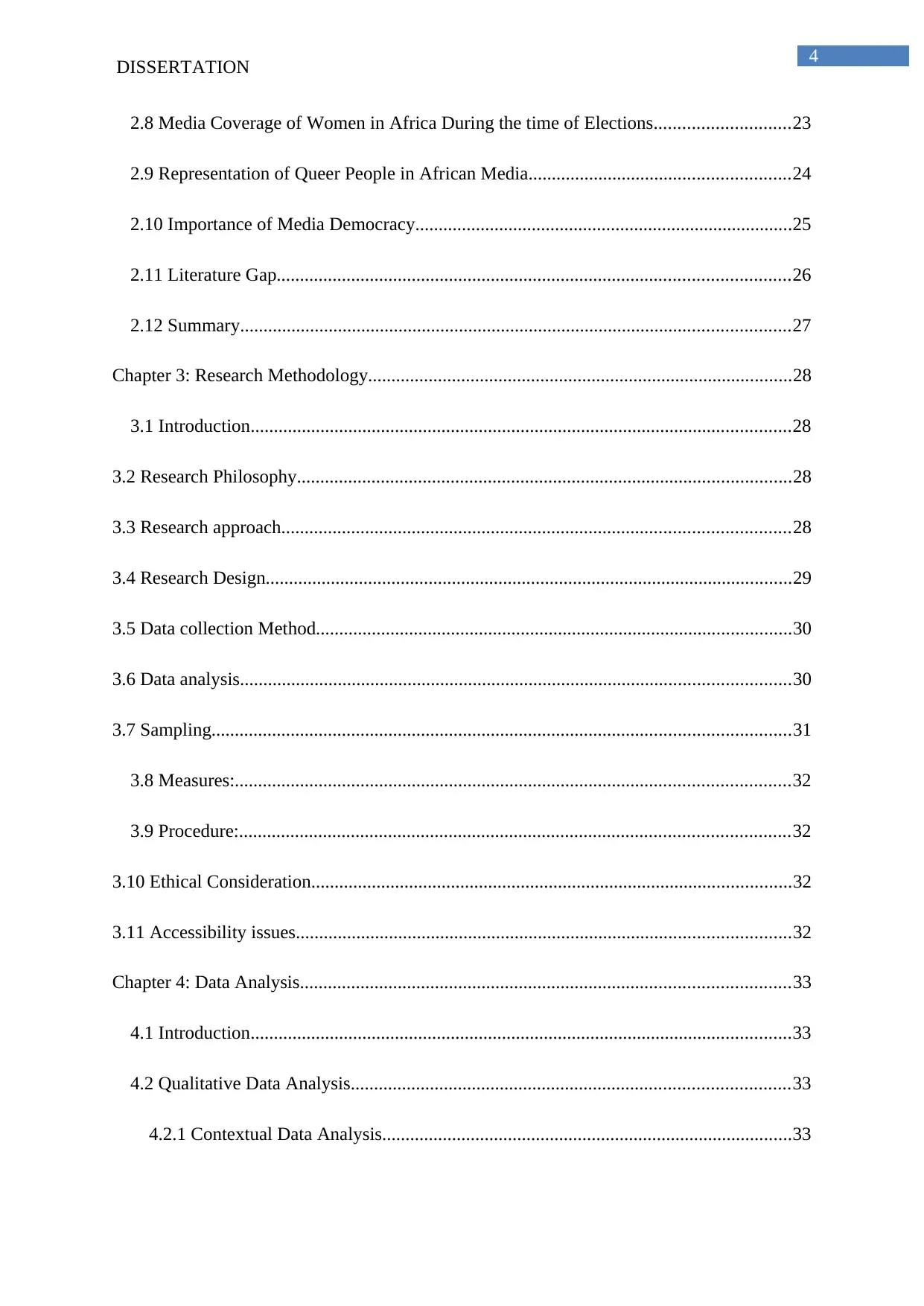
4
DISSERTATION
2.8 Media Coverage of Women in Africa During the time of Elections.............................23
2.9 Representation of Queer People in African Media........................................................24
2.10 Importance of Media Democracy.................................................................................25
2.11 Literature Gap..............................................................................................................26
2.12 Summary......................................................................................................................27
Chapter 3: Research Methodology...........................................................................................28
3.1 Introduction....................................................................................................................28
3.2 Research Philosophy..........................................................................................................28
3.3 Research approach.............................................................................................................28
3.4 Research Design.................................................................................................................29
3.5 Data collection Method......................................................................................................30
3.6 Data analysis......................................................................................................................30
3.7 Sampling............................................................................................................................31
3.8 Measures:.......................................................................................................................32
3.9 Procedure:......................................................................................................................32
3.10 Ethical Consideration.......................................................................................................32
3.11 Accessibility issues..........................................................................................................32
Chapter 4: Data Analysis.........................................................................................................33
4.1 Introduction....................................................................................................................33
4.2 Qualitative Data Analysis..............................................................................................33
4.2.1 Contextual Data Analysis........................................................................................33
DISSERTATION
2.8 Media Coverage of Women in Africa During the time of Elections.............................23
2.9 Representation of Queer People in African Media........................................................24
2.10 Importance of Media Democracy.................................................................................25
2.11 Literature Gap..............................................................................................................26
2.12 Summary......................................................................................................................27
Chapter 3: Research Methodology...........................................................................................28
3.1 Introduction....................................................................................................................28
3.2 Research Philosophy..........................................................................................................28
3.3 Research approach.............................................................................................................28
3.4 Research Design.................................................................................................................29
3.5 Data collection Method......................................................................................................30
3.6 Data analysis......................................................................................................................30
3.7 Sampling............................................................................................................................31
3.8 Measures:.......................................................................................................................32
3.9 Procedure:......................................................................................................................32
3.10 Ethical Consideration.......................................................................................................32
3.11 Accessibility issues..........................................................................................................32
Chapter 4: Data Analysis.........................................................................................................33
4.1 Introduction....................................................................................................................33
4.2 Qualitative Data Analysis..............................................................................................33
4.2.1 Contextual Data Analysis........................................................................................33
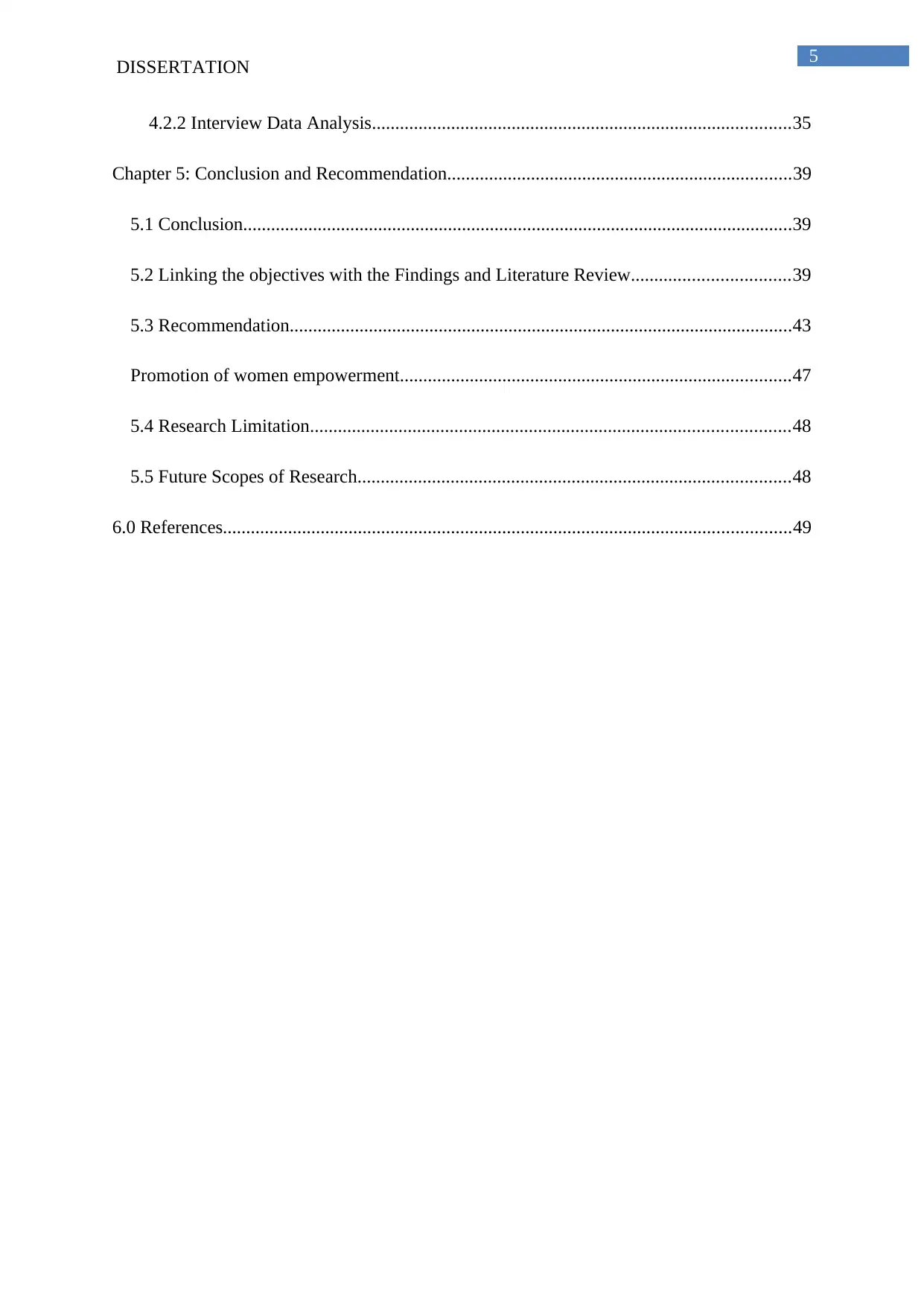
5
DISSERTATION
4.2.2 Interview Data Analysis..........................................................................................35
Chapter 5: Conclusion and Recommendation..........................................................................39
5.1 Conclusion......................................................................................................................39
5.2 Linking the objectives with the Findings and Literature Review..................................39
5.3 Recommendation............................................................................................................43
Promotion of women empowerment....................................................................................47
5.4 Research Limitation.......................................................................................................48
5.5 Future Scopes of Research.............................................................................................48
6.0 References..........................................................................................................................49
DISSERTATION
4.2.2 Interview Data Analysis..........................................................................................35
Chapter 5: Conclusion and Recommendation..........................................................................39
5.1 Conclusion......................................................................................................................39
5.2 Linking the objectives with the Findings and Literature Review..................................39
5.3 Recommendation............................................................................................................43
Promotion of women empowerment....................................................................................47
5.4 Research Limitation.......................................................................................................48
5.5 Future Scopes of Research.............................................................................................48
6.0 References..........................................................................................................................49
⊘ This is a preview!⊘
Do you want full access?
Subscribe today to unlock all pages.

Trusted by 1+ million students worldwide
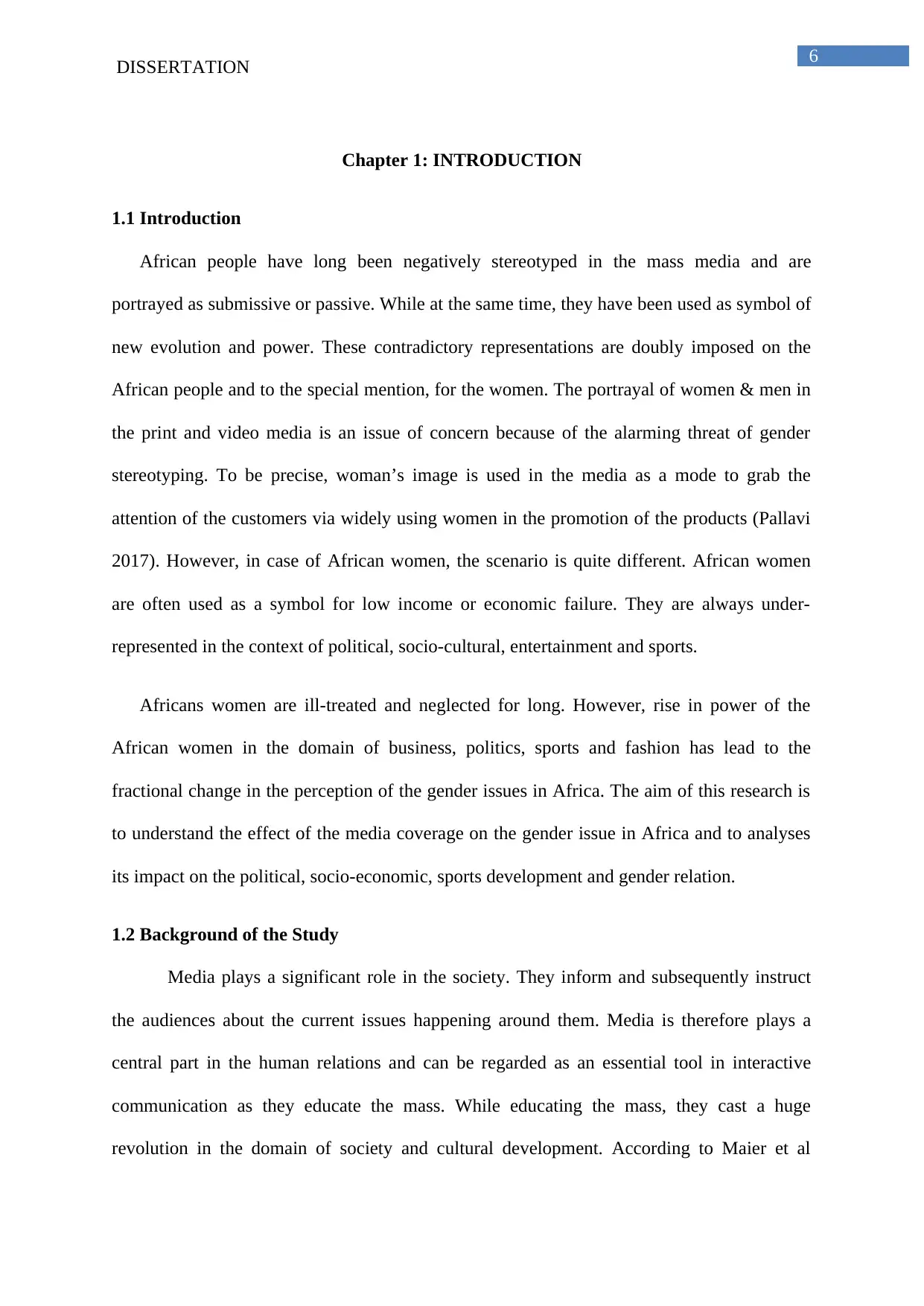
6
DISSERTATION
Chapter 1: INTRODUCTION
1.1 Introduction
African people have long been negatively stereotyped in the mass media and are
portrayed as submissive or passive. While at the same time, they have been used as symbol of
new evolution and power. These contradictory representations are doubly imposed on the
African people and to the special mention, for the women. The portrayal of women & men in
the print and video media is an issue of concern because of the alarming threat of gender
stereotyping. To be precise, woman’s image is used in the media as a mode to grab the
attention of the customers via widely using women in the promotion of the products (Pallavi
2017). However, in case of African women, the scenario is quite different. African women
are often used as a symbol for low income or economic failure. They are always under-
represented in the context of political, socio-cultural, entertainment and sports.
Africans women are ill-treated and neglected for long. However, rise in power of the
African women in the domain of business, politics, sports and fashion has lead to the
fractional change in the perception of the gender issues in Africa. The aim of this research is
to understand the effect of the media coverage on the gender issue in Africa and to analyses
its impact on the political, socio-economic, sports development and gender relation.
1.2 Background of the Study
Media plays a significant role in the society. They inform and subsequently instruct
the audiences about the current issues happening around them. Media is therefore plays a
central part in the human relations and can be regarded as an essential tool in interactive
communication as they educate the mass. While educating the mass, they cast a huge
revolution in the domain of society and cultural development. According to Maier et al
DISSERTATION
Chapter 1: INTRODUCTION
1.1 Introduction
African people have long been negatively stereotyped in the mass media and are
portrayed as submissive or passive. While at the same time, they have been used as symbol of
new evolution and power. These contradictory representations are doubly imposed on the
African people and to the special mention, for the women. The portrayal of women & men in
the print and video media is an issue of concern because of the alarming threat of gender
stereotyping. To be precise, woman’s image is used in the media as a mode to grab the
attention of the customers via widely using women in the promotion of the products (Pallavi
2017). However, in case of African women, the scenario is quite different. African women
are often used as a symbol for low income or economic failure. They are always under-
represented in the context of political, socio-cultural, entertainment and sports.
Africans women are ill-treated and neglected for long. However, rise in power of the
African women in the domain of business, politics, sports and fashion has lead to the
fractional change in the perception of the gender issues in Africa. The aim of this research is
to understand the effect of the media coverage on the gender issue in Africa and to analyses
its impact on the political, socio-economic, sports development and gender relation.
1.2 Background of the Study
Media plays a significant role in the society. They inform and subsequently instruct
the audiences about the current issues happening around them. Media is therefore plays a
central part in the human relations and can be regarded as an essential tool in interactive
communication as they educate the mass. While educating the mass, they cast a huge
revolution in the domain of society and cultural development. According to Maier et al
Paraphrase This Document
Need a fresh take? Get an instant paraphrase of this document with our AI Paraphraser
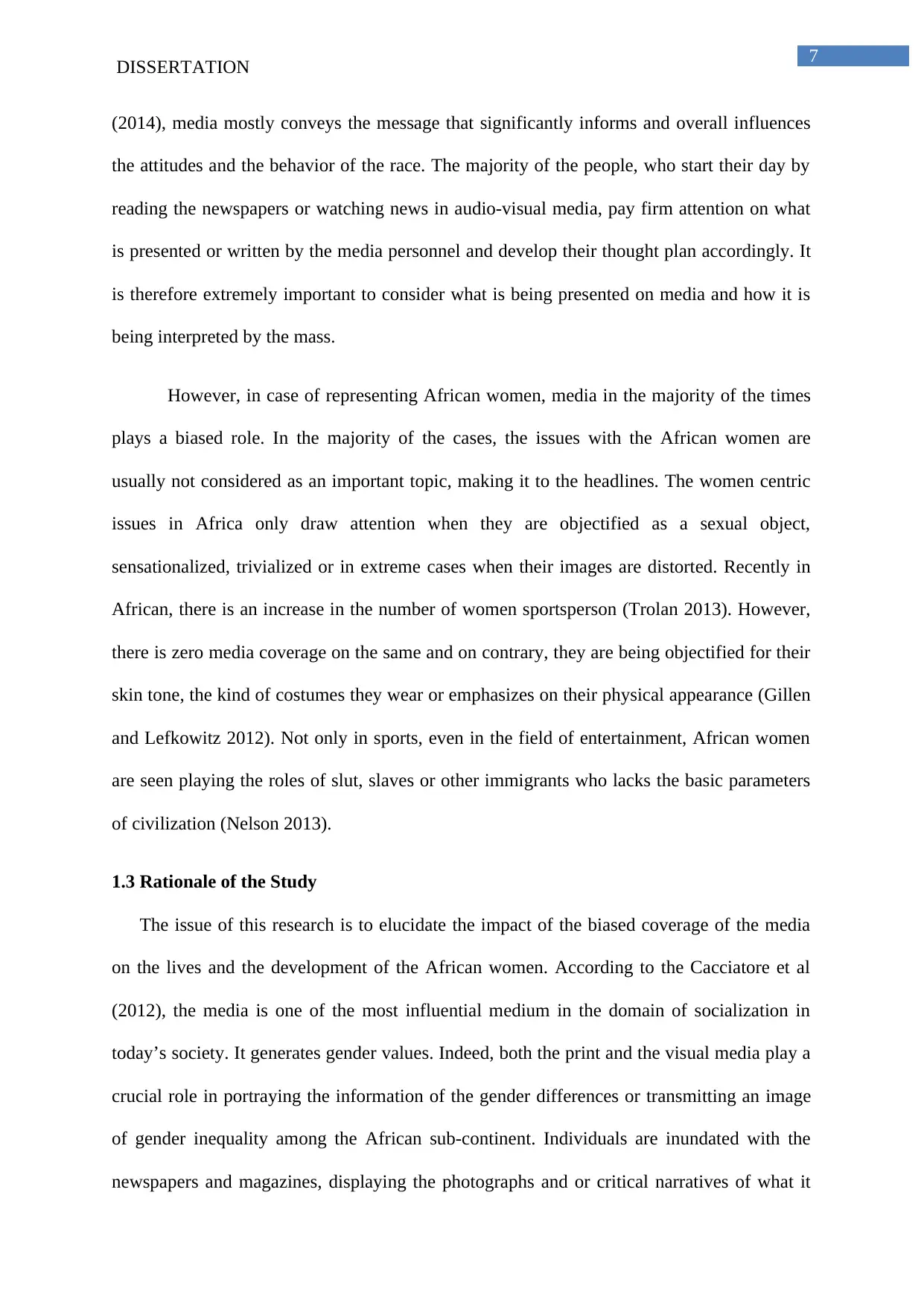
7
DISSERTATION
(2014), media mostly conveys the message that significantly informs and overall influences
the attitudes and the behavior of the race. The majority of the people, who start their day by
reading the newspapers or watching news in audio-visual media, pay firm attention on what
is presented or written by the media personnel and develop their thought plan accordingly. It
is therefore extremely important to consider what is being presented on media and how it is
being interpreted by the mass.
However, in case of representing African women, media in the majority of the times
plays a biased role. In the majority of the cases, the issues with the African women are
usually not considered as an important topic, making it to the headlines. The women centric
issues in Africa only draw attention when they are objectified as a sexual object,
sensationalized, trivialized or in extreme cases when their images are distorted. Recently in
African, there is an increase in the number of women sportsperson (Trolan 2013). However,
there is zero media coverage on the same and on contrary, they are being objectified for their
skin tone, the kind of costumes they wear or emphasizes on their physical appearance (Gillen
and Lefkowitz 2012). Not only in sports, even in the field of entertainment, African women
are seen playing the roles of slut, slaves or other immigrants who lacks the basic parameters
of civilization (Nelson 2013).
1.3 Rationale of the Study
The issue of this research is to elucidate the impact of the biased coverage of the media
on the lives and the development of the African women. According to the Cacciatore et al
(2012), the media is one of the most influential medium in the domain of socialization in
today’s society. It generates gender values. Indeed, both the print and the visual media play a
crucial role in portraying the information of the gender differences or transmitting an image
of gender inequality among the African sub-continent. Individuals are inundated with the
newspapers and magazines, displaying the photographs and or critical narratives of what it
DISSERTATION
(2014), media mostly conveys the message that significantly informs and overall influences
the attitudes and the behavior of the race. The majority of the people, who start their day by
reading the newspapers or watching news in audio-visual media, pay firm attention on what
is presented or written by the media personnel and develop their thought plan accordingly. It
is therefore extremely important to consider what is being presented on media and how it is
being interpreted by the mass.
However, in case of representing African women, media in the majority of the times
plays a biased role. In the majority of the cases, the issues with the African women are
usually not considered as an important topic, making it to the headlines. The women centric
issues in Africa only draw attention when they are objectified as a sexual object,
sensationalized, trivialized or in extreme cases when their images are distorted. Recently in
African, there is an increase in the number of women sportsperson (Trolan 2013). However,
there is zero media coverage on the same and on contrary, they are being objectified for their
skin tone, the kind of costumes they wear or emphasizes on their physical appearance (Gillen
and Lefkowitz 2012). Not only in sports, even in the field of entertainment, African women
are seen playing the roles of slut, slaves or other immigrants who lacks the basic parameters
of civilization (Nelson 2013).
1.3 Rationale of the Study
The issue of this research is to elucidate the impact of the biased coverage of the media
on the lives and the development of the African women. According to the Cacciatore et al
(2012), the media is one of the most influential medium in the domain of socialization in
today’s society. It generates gender values. Indeed, both the print and the visual media play a
crucial role in portraying the information of the gender differences or transmitting an image
of gender inequality among the African sub-continent. Individuals are inundated with the
newspapers and magazines, displaying the photographs and or critical narratives of what it
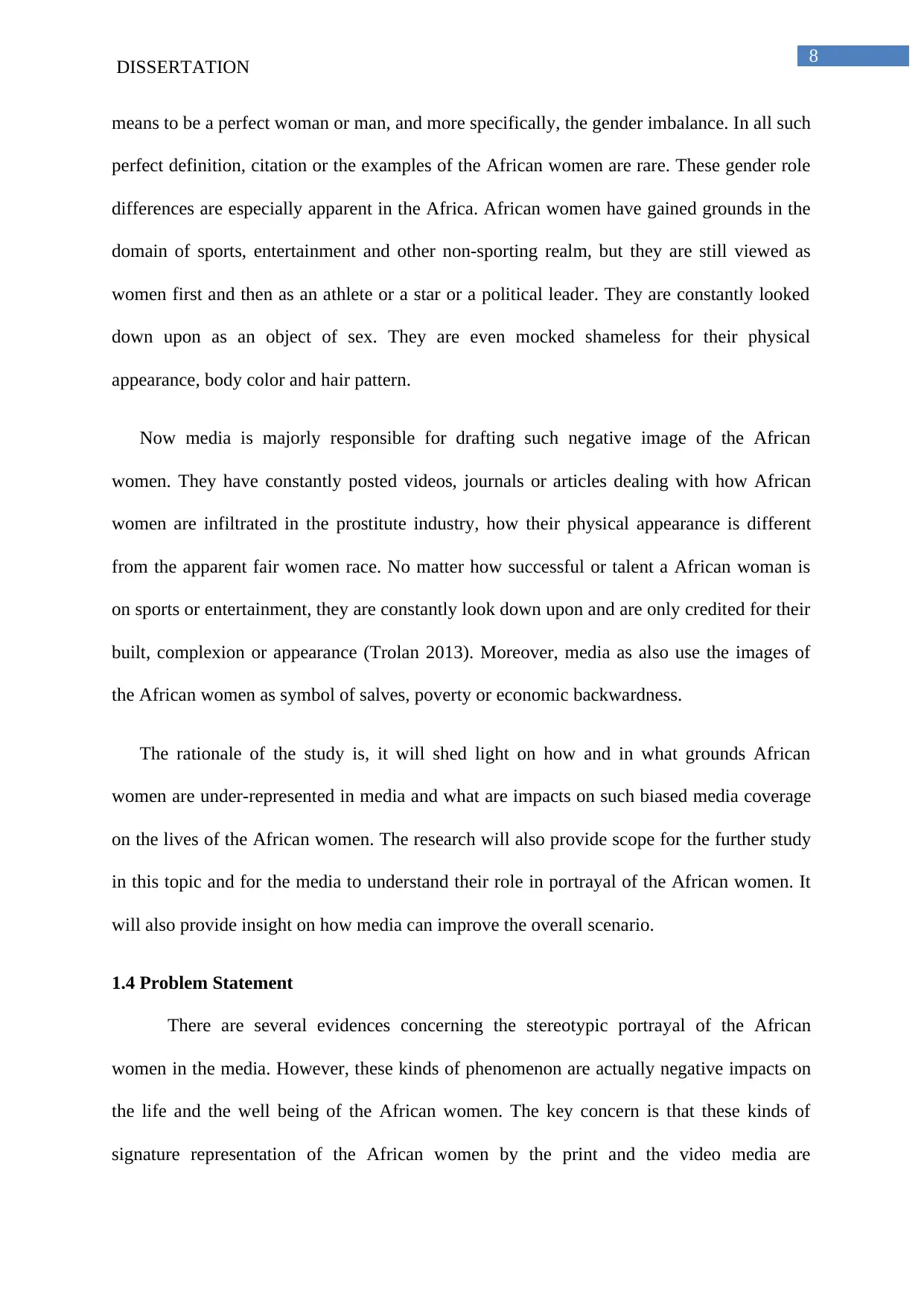
8
DISSERTATION
means to be a perfect woman or man, and more specifically, the gender imbalance. In all such
perfect definition, citation or the examples of the African women are rare. These gender role
differences are especially apparent in the Africa. African women have gained grounds in the
domain of sports, entertainment and other non-sporting realm, but they are still viewed as
women first and then as an athlete or a star or a political leader. They are constantly looked
down upon as an object of sex. They are even mocked shameless for their physical
appearance, body color and hair pattern.
Now media is majorly responsible for drafting such negative image of the African
women. They have constantly posted videos, journals or articles dealing with how African
women are infiltrated in the prostitute industry, how their physical appearance is different
from the apparent fair women race. No matter how successful or talent a African woman is
on sports or entertainment, they are constantly look down upon and are only credited for their
built, complexion or appearance (Trolan 2013). Moreover, media as also use the images of
the African women as symbol of salves, poverty or economic backwardness.
The rationale of the study is, it will shed light on how and in what grounds African
women are under-represented in media and what are impacts on such biased media coverage
on the lives of the African women. The research will also provide scope for the further study
in this topic and for the media to understand their role in portrayal of the African women. It
will also provide insight on how media can improve the overall scenario.
1.4 Problem Statement
There are several evidences concerning the stereotypic portrayal of the African
women in the media. However, these kinds of phenomenon are actually negative impacts on
the life and the well being of the African women. The key concern is that these kinds of
signature representation of the African women by the print and the video media are
DISSERTATION
means to be a perfect woman or man, and more specifically, the gender imbalance. In all such
perfect definition, citation or the examples of the African women are rare. These gender role
differences are especially apparent in the Africa. African women have gained grounds in the
domain of sports, entertainment and other non-sporting realm, but they are still viewed as
women first and then as an athlete or a star or a political leader. They are constantly looked
down upon as an object of sex. They are even mocked shameless for their physical
appearance, body color and hair pattern.
Now media is majorly responsible for drafting such negative image of the African
women. They have constantly posted videos, journals or articles dealing with how African
women are infiltrated in the prostitute industry, how their physical appearance is different
from the apparent fair women race. No matter how successful or talent a African woman is
on sports or entertainment, they are constantly look down upon and are only credited for their
built, complexion or appearance (Trolan 2013). Moreover, media as also use the images of
the African women as symbol of salves, poverty or economic backwardness.
The rationale of the study is, it will shed light on how and in what grounds African
women are under-represented in media and what are impacts on such biased media coverage
on the lives of the African women. The research will also provide scope for the further study
in this topic and for the media to understand their role in portrayal of the African women. It
will also provide insight on how media can improve the overall scenario.
1.4 Problem Statement
There are several evidences concerning the stereotypic portrayal of the African
women in the media. However, these kinds of phenomenon are actually negative impacts on
the life and the well being of the African women. The key concern is that these kinds of
signature representation of the African women by the print and the video media are
⊘ This is a preview!⊘
Do you want full access?
Subscribe today to unlock all pages.

Trusted by 1+ million students worldwide
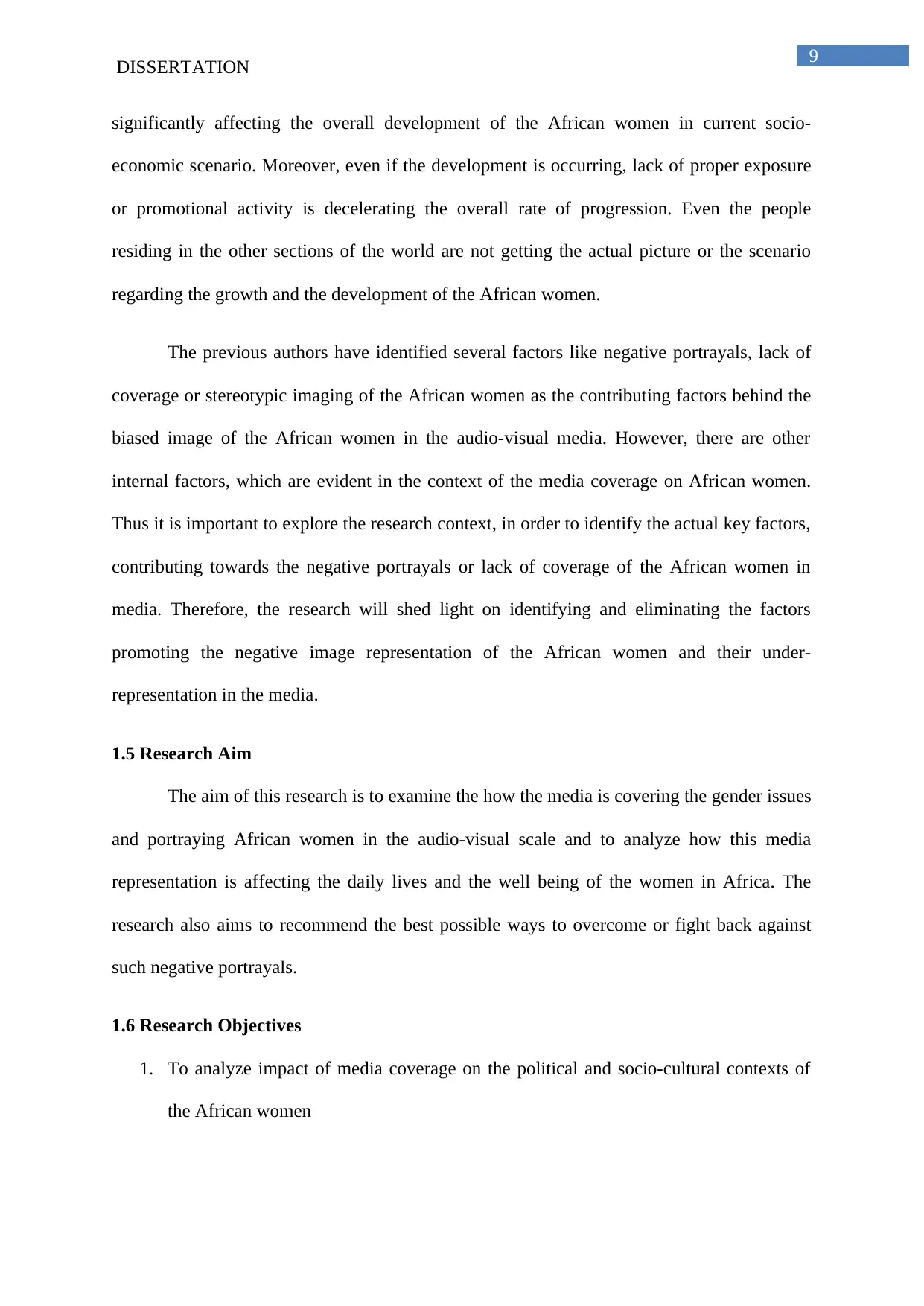
9
DISSERTATION
significantly affecting the overall development of the African women in current socio-
economic scenario. Moreover, even if the development is occurring, lack of proper exposure
or promotional activity is decelerating the overall rate of progression. Even the people
residing in the other sections of the world are not getting the actual picture or the scenario
regarding the growth and the development of the African women.
The previous authors have identified several factors like negative portrayals, lack of
coverage or stereotypic imaging of the African women as the contributing factors behind the
biased image of the African women in the audio-visual media. However, there are other
internal factors, which are evident in the context of the media coverage on African women.
Thus it is important to explore the research context, in order to identify the actual key factors,
contributing towards the negative portrayals or lack of coverage of the African women in
media. Therefore, the research will shed light on identifying and eliminating the factors
promoting the negative image representation of the African women and their under-
representation in the media.
1.5 Research Aim
The aim of this research is to examine the how the media is covering the gender issues
and portraying African women in the audio-visual scale and to analyze how this media
representation is affecting the daily lives and the well being of the women in Africa. The
research also aims to recommend the best possible ways to overcome or fight back against
such negative portrayals.
1.6 Research Objectives
1. To analyze impact of media coverage on the political and socio-cultural contexts of
the African women
DISSERTATION
significantly affecting the overall development of the African women in current socio-
economic scenario. Moreover, even if the development is occurring, lack of proper exposure
or promotional activity is decelerating the overall rate of progression. Even the people
residing in the other sections of the world are not getting the actual picture or the scenario
regarding the growth and the development of the African women.
The previous authors have identified several factors like negative portrayals, lack of
coverage or stereotypic imaging of the African women as the contributing factors behind the
biased image of the African women in the audio-visual media. However, there are other
internal factors, which are evident in the context of the media coverage on African women.
Thus it is important to explore the research context, in order to identify the actual key factors,
contributing towards the negative portrayals or lack of coverage of the African women in
media. Therefore, the research will shed light on identifying and eliminating the factors
promoting the negative image representation of the African women and their under-
representation in the media.
1.5 Research Aim
The aim of this research is to examine the how the media is covering the gender issues
and portraying African women in the audio-visual scale and to analyze how this media
representation is affecting the daily lives and the well being of the women in Africa. The
research also aims to recommend the best possible ways to overcome or fight back against
such negative portrayals.
1.6 Research Objectives
1. To analyze impact of media coverage on the political and socio-cultural contexts of
the African women
Paraphrase This Document
Need a fresh take? Get an instant paraphrase of this document with our AI Paraphraser
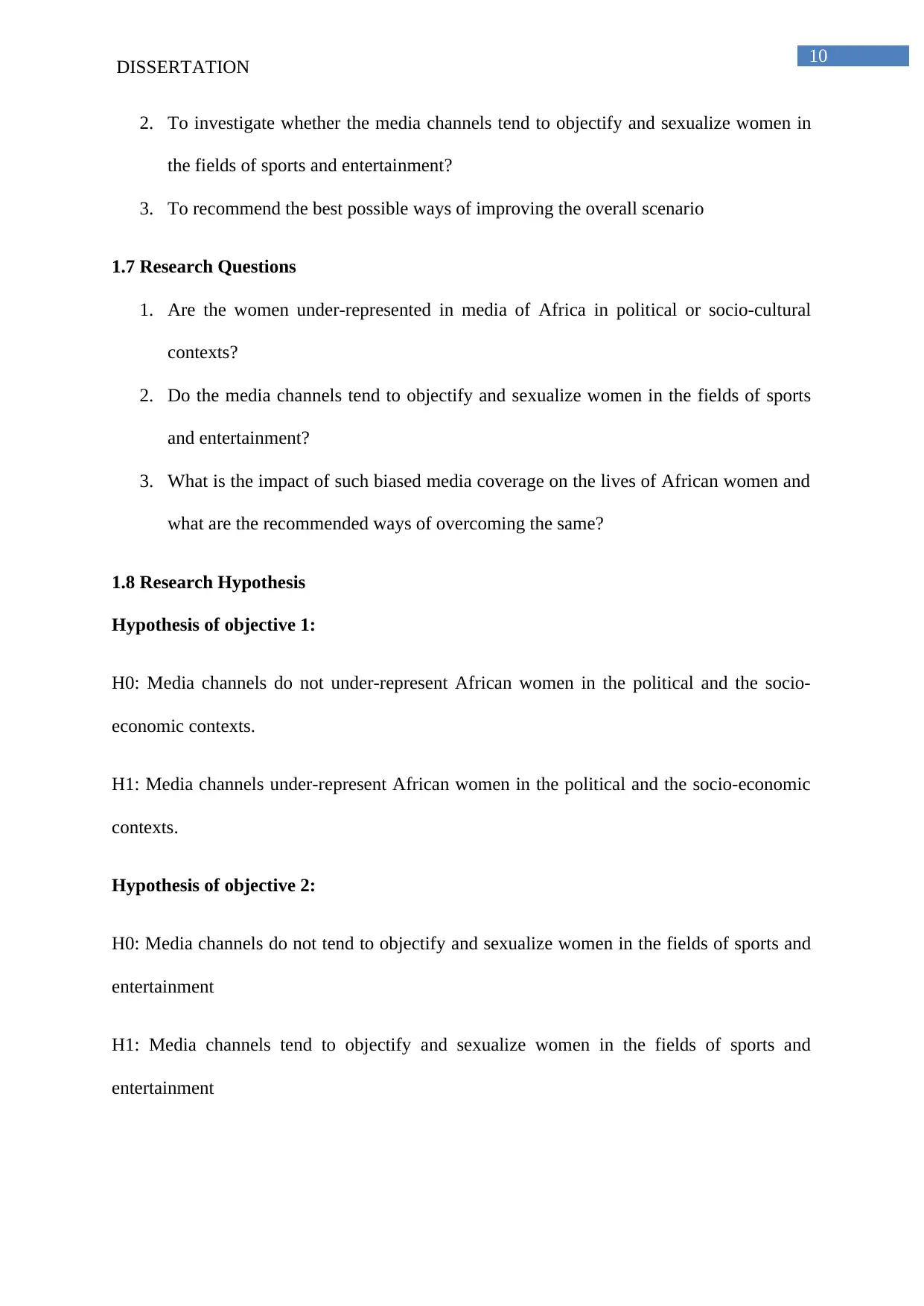
10
DISSERTATION
2. To investigate whether the media channels tend to objectify and sexualize women in
the fields of sports and entertainment?
3. To recommend the best possible ways of improving the overall scenario
1.7 Research Questions
1. Are the women under-represented in media of Africa in political or socio-cultural
contexts?
2. Do the media channels tend to objectify and sexualize women in the fields of sports
and entertainment?
3. What is the impact of such biased media coverage on the lives of African women and
what are the recommended ways of overcoming the same?
1.8 Research Hypothesis
Hypothesis of objective 1:
H0: Media channels do not under-represent African women in the political and the socio-
economic contexts.
H1: Media channels under-represent African women in the political and the socio-economic
contexts.
Hypothesis of objective 2:
H0: Media channels do not tend to objectify and sexualize women in the fields of sports and
entertainment
H1: Media channels tend to objectify and sexualize women in the fields of sports and
entertainment
DISSERTATION
2. To investigate whether the media channels tend to objectify and sexualize women in
the fields of sports and entertainment?
3. To recommend the best possible ways of improving the overall scenario
1.7 Research Questions
1. Are the women under-represented in media of Africa in political or socio-cultural
contexts?
2. Do the media channels tend to objectify and sexualize women in the fields of sports
and entertainment?
3. What is the impact of such biased media coverage on the lives of African women and
what are the recommended ways of overcoming the same?
1.8 Research Hypothesis
Hypothesis of objective 1:
H0: Media channels do not under-represent African women in the political and the socio-
economic contexts.
H1: Media channels under-represent African women in the political and the socio-economic
contexts.
Hypothesis of objective 2:
H0: Media channels do not tend to objectify and sexualize women in the fields of sports and
entertainment
H1: Media channels tend to objectify and sexualize women in the fields of sports and
entertainment
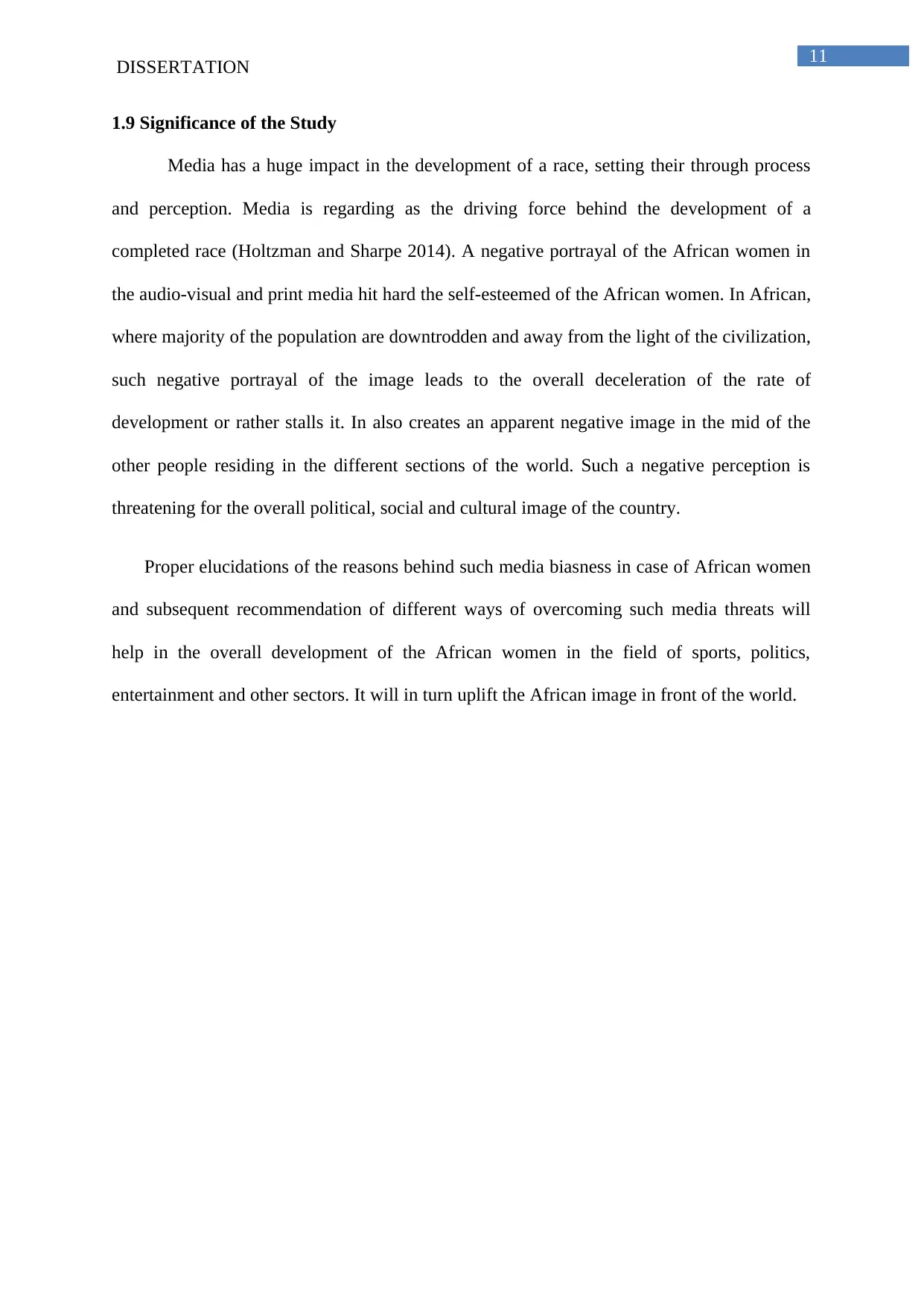
11
DISSERTATION
1.9 Significance of the Study
Media has a huge impact in the development of a race, setting their through process
and perception. Media is regarding as the driving force behind the development of a
completed race (Holtzman and Sharpe 2014). A negative portrayal of the African women in
the audio-visual and print media hit hard the self-esteemed of the African women. In African,
where majority of the population are downtrodden and away from the light of the civilization,
such negative portrayal of the image leads to the overall deceleration of the rate of
development or rather stalls it. In also creates an apparent negative image in the mid of the
other people residing in the different sections of the world. Such a negative perception is
threatening for the overall political, social and cultural image of the country.
Proper elucidations of the reasons behind such media biasness in case of African women
and subsequent recommendation of different ways of overcoming such media threats will
help in the overall development of the African women in the field of sports, politics,
entertainment and other sectors. It will in turn uplift the African image in front of the world.
DISSERTATION
1.9 Significance of the Study
Media has a huge impact in the development of a race, setting their through process
and perception. Media is regarding as the driving force behind the development of a
completed race (Holtzman and Sharpe 2014). A negative portrayal of the African women in
the audio-visual and print media hit hard the self-esteemed of the African women. In African,
where majority of the population are downtrodden and away from the light of the civilization,
such negative portrayal of the image leads to the overall deceleration of the rate of
development or rather stalls it. In also creates an apparent negative image in the mid of the
other people residing in the different sections of the world. Such a negative perception is
threatening for the overall political, social and cultural image of the country.
Proper elucidations of the reasons behind such media biasness in case of African women
and subsequent recommendation of different ways of overcoming such media threats will
help in the overall development of the African women in the field of sports, politics,
entertainment and other sectors. It will in turn uplift the African image in front of the world.
⊘ This is a preview!⊘
Do you want full access?
Subscribe today to unlock all pages.

Trusted by 1+ million students worldwide
1 out of 57
Related Documents
Your All-in-One AI-Powered Toolkit for Academic Success.
+13062052269
info@desklib.com
Available 24*7 on WhatsApp / Email
![[object Object]](/_next/static/media/star-bottom.7253800d.svg)
Unlock your academic potential
Copyright © 2020–2026 A2Z Services. All Rights Reserved. Developed and managed by ZUCOL.





